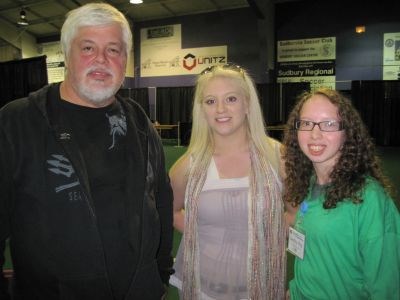Captain Paul Watson, a founder of the environmental organization Greenpeace and the Sea Shepherd Conservation Society, made no apologies for his brand of activism at Green Earth Expo, an environmental trade show April 24 at the Exhibition Centre.
“My epiphany came years ago in the early 1970s when we were trying to put ourselves between a pod of eight sperm whales and a Russian whaling ship bearing down upon us,” Watson remarked.
“A harpoon was fired over our heads into a female sperm whale. She screamed, almost like a human. Then the largest whale, a male, hurled himself at the Russian harpooner on the ship in order to protect his pod. They knew that would happen and were waiting. They fired a harpoon into his head.”

Veteran environmentalist Paul Watson, a founder of Greenpeace, and Master and Commander of the Sea Shepherd Conservation Society, was featured speaker April 24 at the Green Earth Expo at the Exhibition Centre, Falconbridge Road. Pictured with him are university students Sierra Harris and Destiny Roy. Both women said they were so inspired by Watson's speech they would like to join his crew. Photo by Bill Bradley.
The whale fell back, dived and resurfaced, dying, beside Watson's small boat.“He knew we were there. He could have crushed us with his bulk. But he looked at us with his great eye. It had a look of understanding. He knew we were there trying to protect his pod of whales,” Watson recounted. “He also seemed to show a degree of pity for us, as a species, that we would do this to another intelligent being, to commit such a ruthless act.”
Watson claimed the oil the Russian whalers were seeking from the animals, was used in a product used in armaments, in intercontinental missiles.“We would kill these beautiful intelligent mammals in order to use their oils to help manufacture weapons that could destroy us all? It made no sense to me. It was insane.”
The experience with the sperm whales so inspired him that Watson said from that day forward he would consider the whales, dolphins, tuna, sharks and other ocean denizens as his true clients, caring not what governments nor corporations said about his crew' exploits.
Watson, originally from Toronto, claiming his organization had boarded more ships, rammed more ships, and engaged in more high seas confrontations than the Canadian Navy in the period since World War Two.He said his actions were against those fleets which were in violation of international law. He said neither he or his crews have been charged for their actions not have there been any injuries sustained to crew members in 33 years of environmentalism.
“In 1986 we stopped the Icelandic fleet by ramming their ships and sinking them. We could not get them to charge us because they knew they were operating illegally.”Three Sea Shepherd ships in actions against the Japanese whaling fleet in the southern ocean around Antarctica recently were able to prevent the killing of over 500 whales, cutting their quota in half, he said.
“Sea Shepherd successfully saved 528 whales-our biggest impact on the whale quota to date. Of 50 humpback whales that were targeted, they did not take a single one.”One of his ships, the Steve Irwin, currently at dock in New York City, will shortly set sail for the Mediterranean Sea to confront bluefin tuna poachers who are endangering stocks of the species, he said.
He recounted how Japanese companies now were stockpiling tuna carcasses in cold storage warehouses, waiting for the price for each fish to skyrocket as the numbers of the fish worldwide collapsed.“Each mature bluefin tuna now is worth $100,000. As the species is decimated by overfishing and nears extinction, they will be worth up to $1,000,000 each. That is what we are up against-the economics of greed.”
When asked what the public can do, Watson was blunt.“Don't eat fish. Support our organization. Help with our shore activities. Join our crew.” He said he was looking for volunteers with passion over paper qualifications.“Make yourself a nuisance. Then we will hear about you,” he said as he chuckled.
Two university students, Sierra Harris and Destiny Roy, said there were so impressed with Watson's talk that they would investigate how to join Watson's ships.“I loved his talk,” Harris said. She is a Guelph University agriculture student. “It almost made me cry to hear this. I would like to be on his ship.”
Destiny Roy, a Laurentian University environmental and earth studies student, said she was inspired by Watson.“I was moved to hear we can make a difference, even in our small communities,” Roy said. “Sudbury has done a lot itself. It is something we can bring to the rest of the world.”
For more information, visit www.seashepherd.org.
